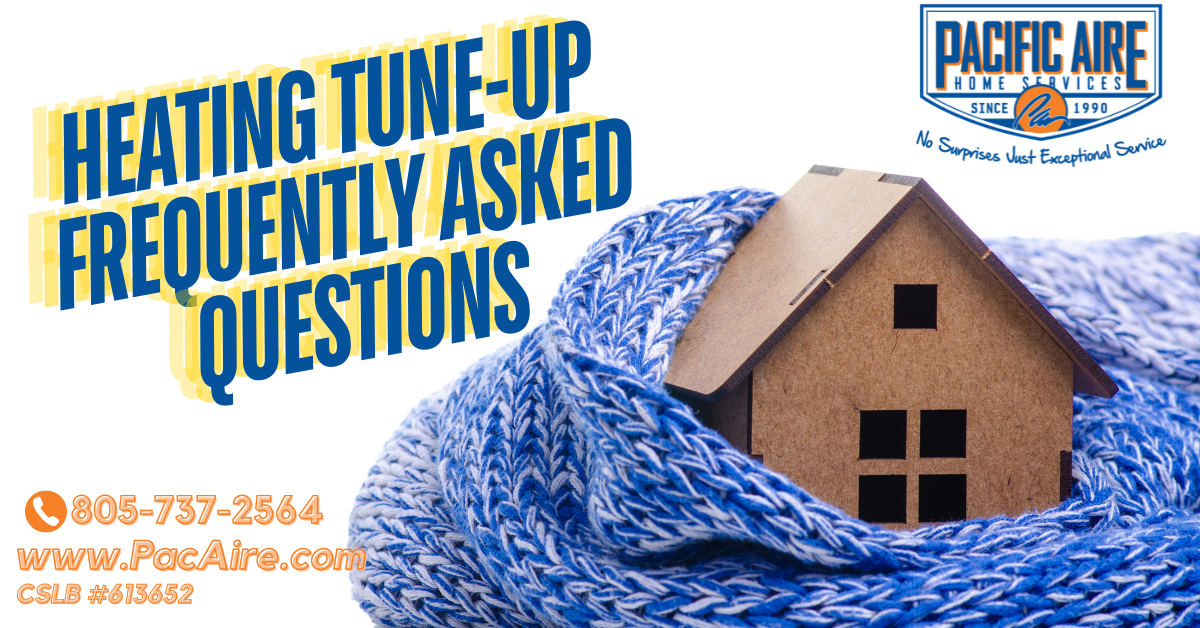As the colder months approach, ensuring that your home’s heating system is ready to handle the chill is essential. A heating tune-up can help avoid unexpected breakdowns, improve energy efficiency, and keep your family safe. In this article, we’ll explore frequently asked questions about heating tune-ups and offer advice on keeping your system in top condition.
1. How often should you tune up your HVAC?
It’s generally recommended to schedule a heating tune-up for your HVAC system once a year, preferably before the cold season starts. Regular heating service keeps your system running efficiently, reducing the likelihood of breakdowns and the need for unexpected furnace repairs.
For an energy-efficient furnace, annual maintenance is especially important to ensure it operates at peak performance. Regular tune-ups help your heating system maintain optimal efficiency, which directly affects your heating bill. Skipping yearly maintenance can lead to increased energy costs, and over time, it may shorten the lifespan of your residential furnace.
2. What does an HVAC tune-up include?
A comprehensive HVAC tune-up involves a thorough inspection, cleaning, and adjustment of your heating system. Here’s what typically happens during a heating tune-up:
- Thermostat Check: The technician checks your thermostat, including any digital thermostat you may have, ensuring it provides accurate temperature control and adjusts it as necessary.
- Filter Inspection and Replacement: Dirty air filters hinder airflow, forcing your system to work harder, which can lead to higher energy consumption. The technician will clean or replace these filters.
- Carbon Monoxide and Gas Leak Detection: The technician will test for gas leaks and check for carbon monoxide safety to ensure that your furnace is operating safely. Gas leaks and carbon monoxide exposure can be dangerous if left undetected.
- Furnace Inspection: A thorough furnace safety check will look for any signs of wear and tear on the system, such as cracks in the heat exchanger, which could lead to serious issues.
- Electrical Components and Connections: The technician will inspect all electrical connections and tighten any loose wires to prevent future breakdowns.
- Lubrication and Cleaning: All moving parts will be lubricated, and the system will be cleaned to prevent excessive wear and tear.
This service ensures your heating system is safe and efficient, potentially lowering your average heating bill.
3. Is an HVAC tune-up worth it?
Yes, an HVAC tune-up is definitely worth the investment. Here’s why:
- Improved Efficiency: A well-maintained system uses less energy, which can reduce your heating bill. Even an energy-efficient furnace requires regular maintenance to perform at its best.
- Fewer Repairs: A heating tune-up helps identify small issues before they become major problems, reducing the need for costly emergency furnace repairs.
- Increased Longevity: Regular maintenance extends the lifespan of your furnace. Without proper care, a system can break down prematurely, leading to more frequent replacements.
- Enhanced Safety: Annual tune-ups include gas leak detection and carbon monoxide safety tests, ensuring that your home is protected from these serious hazards.
In the long run, the cost of regular maintenance is far lower than the expense of major repairs or system replacements, making it a wise choice for homeowners.
4. How long does a heating tune-up take?
A heating tune-up typically takes between 1 to 2 hours, depending on the complexity of your system and any issues that may arise. During this time, the technician will thoroughly inspect, clean, and adjust your system to ensure it is operating efficiently.
If problems like faulty components or safety hazards are found, the appointment may take longer, especially if additional repairs are needed. However, investing a couple of hours in a biannual heating tune-up is a small price to pay for avoiding potential breakdowns during the cold season.
5. How does a tune-up impact my heating bill?
A heating tune-up can positively impact your heating bill by making your system more energy efficient. When your system is clean and properly adjusted, it doesn’t have to work as hard to heat your home, which reduces energy consumption.
For example, an energy-efficient furnace is designed to use less energy, but if it’s not regularly maintained, it can lose its efficiency over time. A tune-up ensures that the system is running at its best, keeping your average heating bill as low as possible. The savings you see on your heating bill often offset the cost of the tune-up, making it a financially smart decision.
6. What safety checks are included in a heating tune-up?
Furnace safety is a top priority during a heating tune-up. The technician will conduct several important safety checks, including:
- Carbon Monoxide Testing: Carbon monoxide is a colorless, odorless gas that can be deadly in high concentrations. During a tune-up, the technician will test for carbon monoxide leaks and ensure that your system is properly ventilated.
- Gas Leak Detection: Any leaks in your gas furnace will be detected and repaired to prevent the risk of fire or explosion.
- Heat Exchanger Inspection: Cracks in the heat exchanger can lead to carbon monoxide leaks. The technician will inspect the heat exchanger for any signs of damage and recommend repairs if necessary.
These safety measures are essential for protecting your home and family, especially during the colder months when your furnace is running frequently.
A heating tune-up is an essential part of maintaining your HVAC system. By scheduling a biannual heating service, you can keep your residential furnace running efficiently, lower your heating bill, and ensure your family’s safety with thorough carbon monoxide safety checks and gas leak detection.
Visit https://www.pacaire.com/heating-services/heating-tune-up/ or call us at 805-737-2564 to schedule your heating maintenance today.


